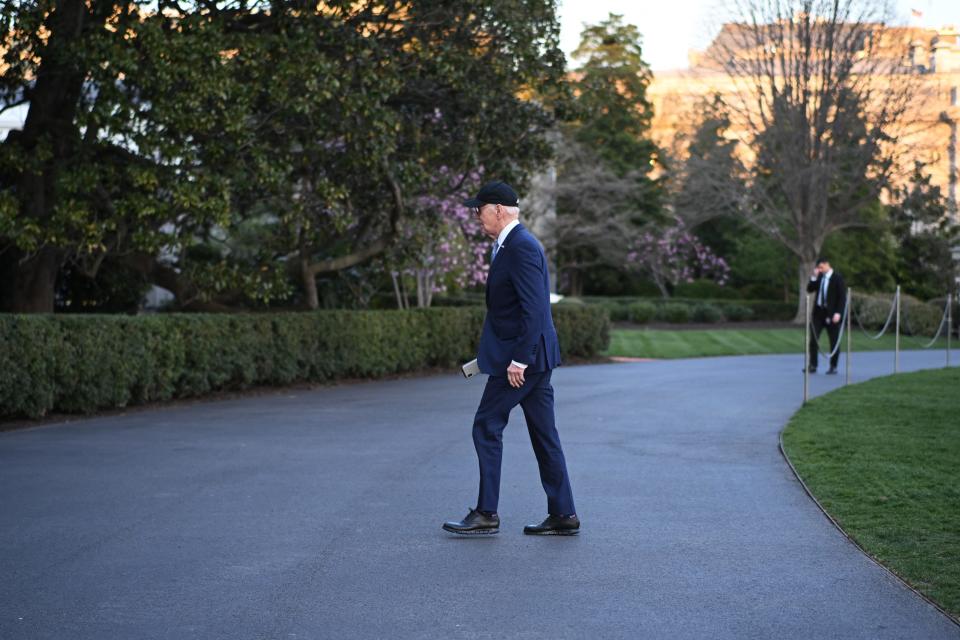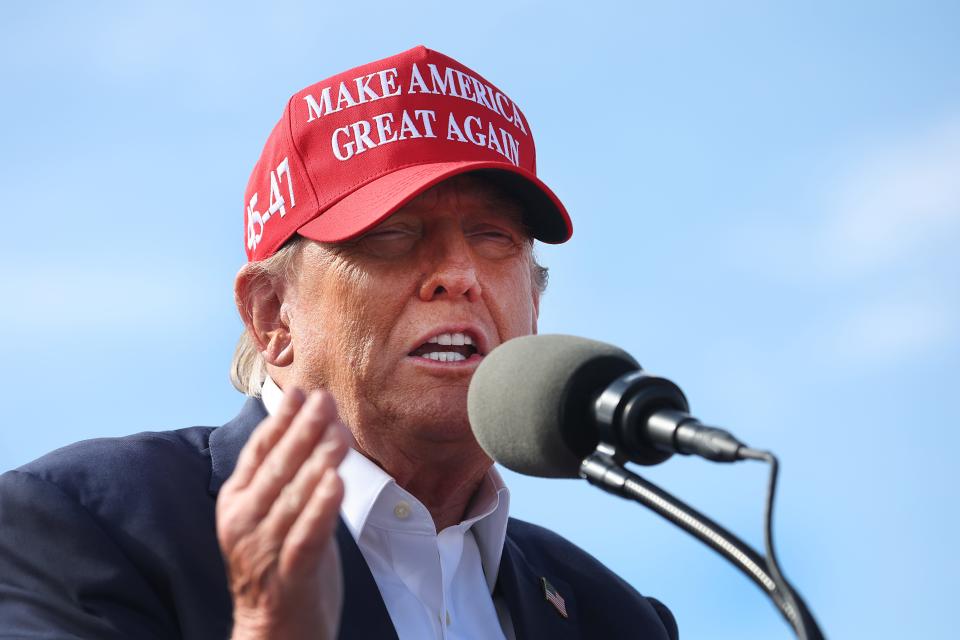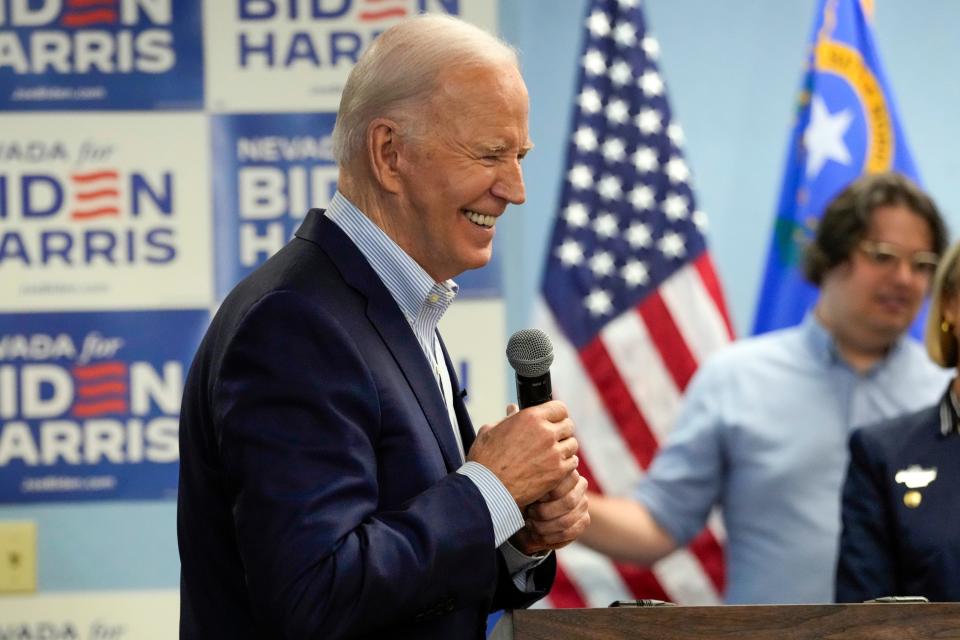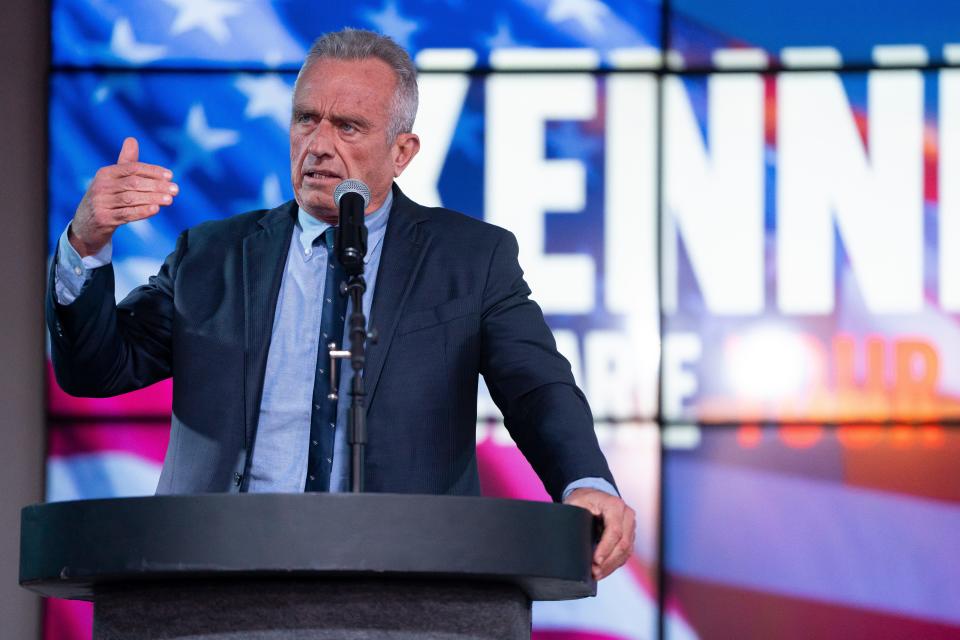Meet the surging ‘double haters’ who could decide whether Biden or Trump wins the election
WASHINGTON ― Jana Pender is no fan of Donald Trump. "All his lies. He's despicable," said the 67-year-old retired casino housekeeper from Detroit.
Yet despite voting for President Joe Biden in the 2020 election, Pender is not backing him in 2024. She said Biden has "blood on his hands" for supporting Israel's war against Hamas in the Gaza Strip.
"If nothing changes, I know I won't vote for Trump and I know I won't vote for Biden," Pender said. "I just know I can't vote for either of these people."
Pender falls squarely within a group of voters known as the "double haters"? those who dislike Biden, the incumbent Democratic president, and Trump, the former president and presumptive Republican nominee.
This year, this group of skeptics is large and powerful. Double haters make up about 15% of the electorate, according to a poll this month by USA TODAY/Suffolk University, giving them significant sway in deciding the outcome of the November election. Other polls have found double haters make up as much as one-fifth of likely voters.

They pose a challenge for Biden as his campaign looks to keep the Democratic coalition united ? amid signs of splintering ? and not jump ship to one of the third-party candidates or sit the election out altogether. But double haters are also a wild card for Trump, whose divisiveness turns many of them off.
The USA TODAY/Suffolk University poll, taken March 8-11, found Trump leading Biden 40%-38% among registered voters, followed by independent candidate Robert F. Kennedy, 9%.
Twenty-five percent of the double haters supported Trump in the survey, compared to 18% for Biden. About 44% of the double haters currently back various third-party candidates. Kennedy drew more of these voters, 21%, than Biden did. Green Party candidate Jill Stein had the backing of 7% of double haters, while independent Cornel West was supported by 6%.
"He would be top on my list of people to vote for," Sally Power, 73, of Pittsburgh, Pa., said of Kennedy. Power, who runs a nonprofit women's retail shop, doesn't approve of Trump's "statements and interactions with others," but has concerns about Biden's age and capacity to effectively serve another term until he's 86 years old.
"I don't want to vote for either one of them, honestly. That's the problem. And I think I'm not alone in saying that," said Power, who voted for Trump in 2016 but Biden in 2020. "I find both of them not representative of my views. And I don't see them as being representative of the country."

Who are the double haters?
In the 2016 election, Trump performed 17 percentage points better than Hillary Clinton among the double-hater voters ? who made up about 20% of the vote ? steering him to victory.
In 2020, Biden enjoyed higher favorability marks than Trump ? 49% to Trump's 45% in October of that year, according to Gallup ? producing fewer double haters. They accounted for only 3% of voters in 2020. But this year, 55% of registered voters have an unfavorable opinion of Biden, according to the USA TODAY/Suffolk University Poll, while 55% also have an unfavorable opinion of Trump.
"I think they will end up being the key swing vote because they're the ones that could go third-party," said Celinda Lake, a Democratic pollster who conducted polling for Biden's 2020 campaign. "They are the ones that could decide to stay home. They are the ones that swing back and forth because they're not anchored by affection, they're anchored by disaffection. These are the voters who decided 2016."
Double haters are composed of an equal number of Democrats and Republicans. Many consider themselves independents. They skew younger. Most are white but Latino voters also make up a sizable share. Double haters are among those voters who have lingering concerns about the state of the economy despite a robust jobs market, low unemployment and a booming stock market.
Forty-percent of double haters in the USA TODAY/Suffolk University poll said the economy is the most important issue that will determine their vote, followed by immigration, 21%.
Many double hates are wary of Biden's age ? even though Trump, 78, isn't significantly younger ? and convinced Biden has been weak and ineffective in office. But they have a fear factor with Trump ? what they perceive as self-centeredness, the constant drama with his court cases, his controversial statements that echo dictators, and his efforts to overturn the 2020 election.
"I think Biden's been an abject failure," said Robert Brown, a 35-year-old from Minneapolis, who works in marketing and advertising. "Trump's a piece of s---, too. Just to be real." Brown said he's leaning toward voting for Kennedy. "He's a third option. How many times do we have to pick the lesser of two evils, right?"
Peter O'Connor, a 26-year-old student studying strategic communications at The Ohio State University, voted for Biden in 2020 and doesn't like Trump. He is considering a vote for Kennedy this year. "I've heard a little bit about this Robert Kennedy guy. He sounds interesting to me," O'Connor said.
Jim Meikle, 80, from Albrightsville, Pa., called Trump "an egotistical maniac" who cares about himself, not the country. Still, he said he will likely vote for Trump again, like he did in 2016 and 2020, over Biden, who he criticized over migration at the southern border, pushing the expansion of electric vehicles and his administration's rocky military withdrawal from Afghanistan in 2021.
"You know, it's really a shame. We've got a population of over 300 million people in this country, and this is the best that we can offer to be our president?" said Meikle, an 80-year-old retired manager at a sheet metal plant.

Can Biden win the double haters back?
In a troubling sign for Biden, 87% of the double-hater voters in the USA TODAY/Suffolk University poll said they believe the country is on the wrong track. Only 11% said they approve of Biden's job performance, compared to 41% who said they approved of the job Trump did as president from 2017 to 2021.
"If you're Biden, you have to say, 'Hey, your memory is wrong, his presidency was awful compared to mine,'" said David Paleologos, director of the Suffolk University Political Research Center. "Or if you're Trump, you have to say, 'All of this boogeyman stuff against me, is unfounded. I was president for four years, the world didn't fall apart and people have pretty good impressions of what I did.'"
This week, Biden started to embrace an age-old election question that Trump has posed: "Are you better off than you were four years ago?"
“I hope everyone in the country takes a moment to think back what it was like in March of 2020 - COVID had come to America and Trump was president," Biden told supporters Wednesday at a fundraiser in Dallas. He described a period in which hospitals were overcrowded, nurses wore garbage bags for protection, unemployment soared to 14% and the stock market crashed.

Paleologos said double-haters' fixation on the economy presents an opportunity for Biden, pointing to growing optimism among Americans that the economy has recovered from the pandemic. Thirty-three percent of registered voters now believe an economic recovery is underway, compared to a low of 9% in July 2022.
"To me, there's an opportunity for Biden to do something that Hillary Clinton was not able to do in 2016, which is to either make Trump more unfavorable," Paleologos said, or make inroads among double haters over the economy. "The fact of the matter is if the economy continues to rebound, that's Joe Biden's economy."
Lake, who regularly conducts focus groups with likely voters, said the Biden campaign must first crystalize the choice before voters when it comes to Biden and Trump.
"Do you want someone who you think may be a little old or do you want someone who you think may be a little crazy? And God knows where he would take the country," Lake said of Trump.
Yet that contrast alone might not be enough. "Right now, they're headed to third party," she said, arguing it puts the onus on Democrats for voters to understand that the third-party candidates "are not viable, and they may not be who you think they are."
Data suggests the popularity of third-party candidates is often inflated when voters are given their names in a poll. It's also unclear how many states they will make it on the ballot.
Yet even if Kennedy, Stein and West don't match their current polling in November, they could be major factors in battleground states potentially decided by a few thousand votes or less.
Ultimately, whether Biden can win over double haters mulling a third-party vote could come down to their perceptions of the economy. Lake said they must connect how the president's policies have improved their outlook.
"These are downscale voters who need steady progress," Lake said. "They need six months of good news. So the most important thing for them is going to be what's the economy in May and June. You tell me what their perceptions of the economy are in May and June, and I'll tell you where they're headed."
Reach Joey Garrison on X, formerly Twitter, @joeygarrison.
This article originally appeared on USA TODAY: 'Double haters' could decide whether Biden or Trump wins in 2024
